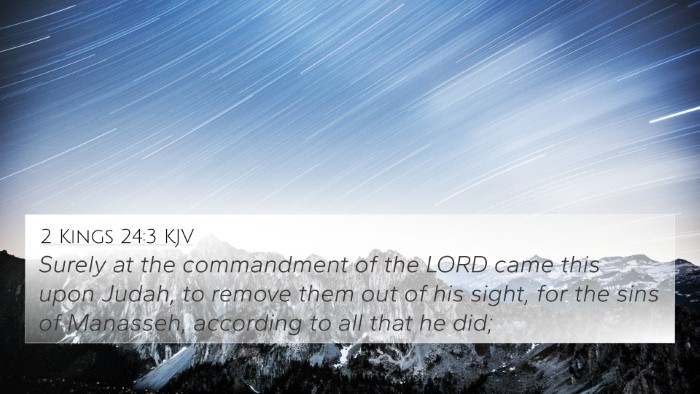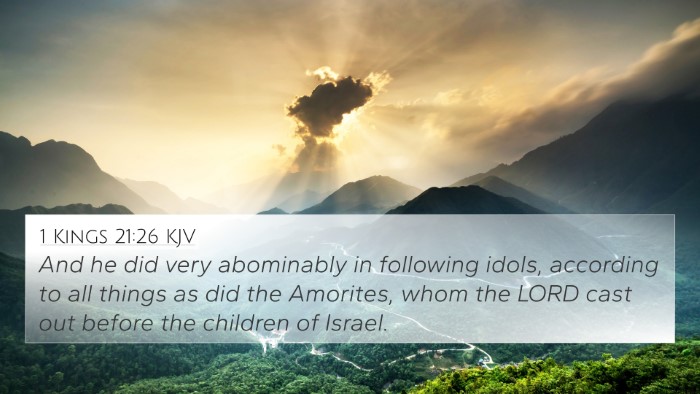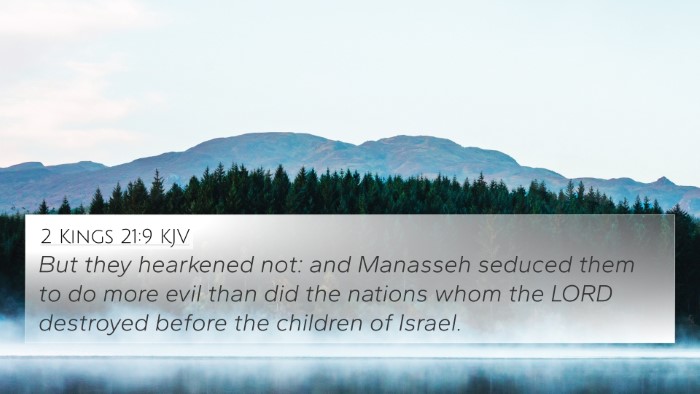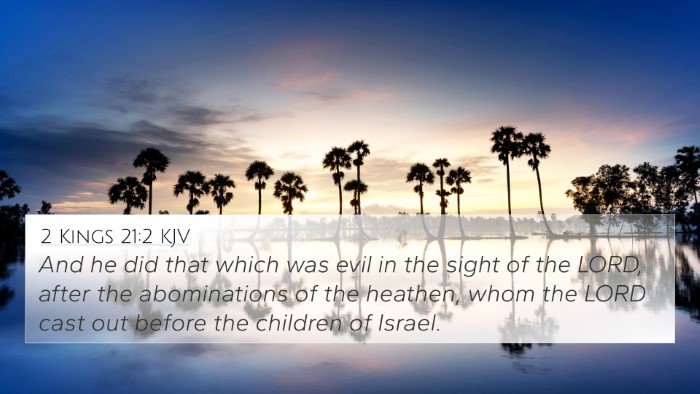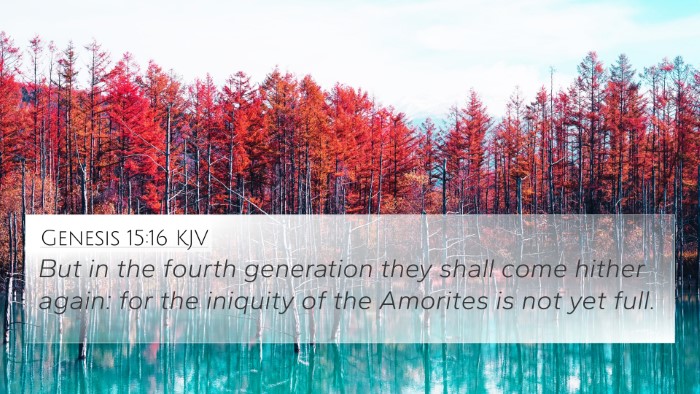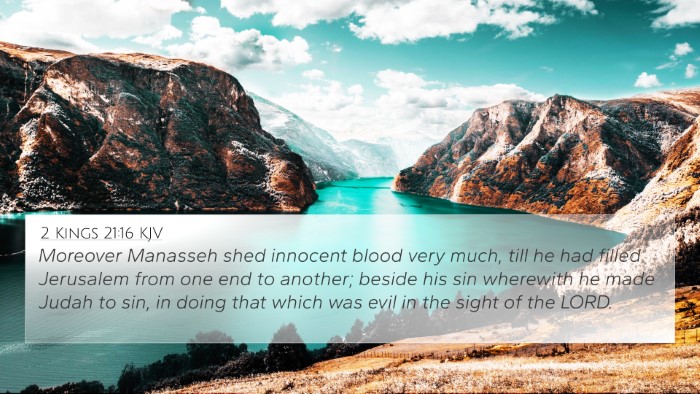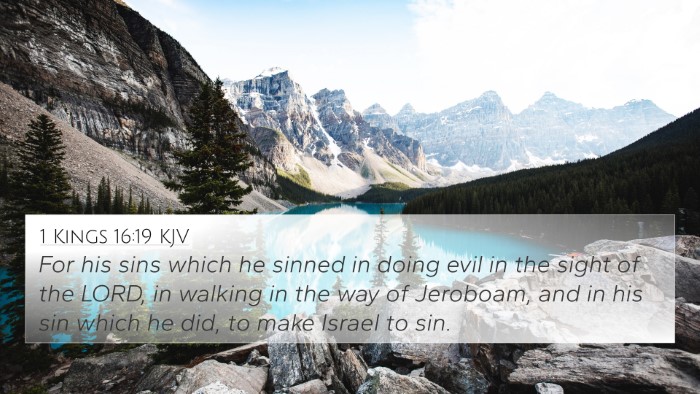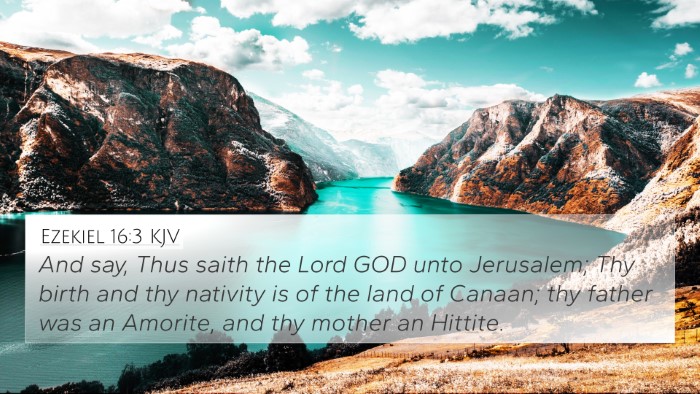Understanding 2 Kings 21:11
2 Kings 21:11 states, "Because Manasseh king of Judah hath done these abominations, and hath done wickedly above all that the Amorites did, which were before him, and hath made Judah also to sin with his idols."
Context and Background
This verse is situated during the reign of King Manasseh, who is portrayed as one of the most wicked kings of Judah. The evaluation of his actions reveals a stark contrast to the righteous standards set forth by God.
Commentary Insights
-
Matthew Henry:
Henry asserts that Manasseh’s abominations were not just personal sins but had a broader impact on the nation of Judah. His idolatry led the people away from God, demonstrating how a leader's actions can affect the spiritual condition of a society.
-
Albert Barnes:
Barnes emphasizes the severity of Manasseh's sins, comparing them to the Amorites, a people known for their detestable practices. He illustrates that Manasseh's actions were a direct affront to God, indicating the depth of Judah's spiritual decline.
-
Adam Clarke:
Clarke notes that Manasseh’s sins included extreme idolatry and that his influence was a catalyst for widespread sin in Judah. He highlights the role of idolatry in leading God’s people into corruption, underlining the importance of fidelity to God’s commandments.
Thematic Bible Verse Connections
Understanding this verse can be enriched by cross-referencing with several other scriptures that illustrate similar themes of idolatry, leadership, and divine judgment.
- 1 Kings 14:9-11: Discusses Jeroboam's sins, portraying a history of idolatry in Israel.
- 2 Chronicles 33:1-9: Provides a detailed account of Manasseh's reign, showcasing his idolatrous practices and later repentance.
- Jeremiah 7:30-31: Highlights the abominations committed by the people of Judah, linking their sinfulness to divine judgment.
- Ezekiel 16:20-21: Uses vivid imagery to depict the idolatry committed by Israel, paralleling the actions of Manasseh.
- Romans 1:18-25: Discusses the abandonment of God for idols, reflecting a timeless principle of humanity's rebellion against God.
- Revelation 2:20: Warns against tolerance of false teachings and idolatry in the church, similar to the warnings given to Judah.
- Galatians 5:19-21: Lists the works of the flesh, including idolatry, paralleling the actions leading to Manasseh’s condemnation.
Exploring the Depth of Idolatry
Manasseh’s actions serve as a cautionary tale about the dangers of turning away from God. His influence is a reminder that leaders hold great responsibility for guiding their people in faith. The idolatrous practices he introduced not only affected him personally but corrupted the entire nation.
Key Lessons Learned
- The profound impact of leadership on the moral and spiritual state of a community.
- The danger of idolatry in any form, which can lead to individual and corporate downfall.
- God’s patience with His people is paramount, yet there are ultimate consequences for turning away.
- The importance of repentance and return to God, as later exemplified by Manasseh.
Practical Application
Reflecting on 2 Kings 21:11 encourages modern readers to examine their own lives and the influences they have, whether through leadership in communities, churches, or families. It prompts the question: Are we leading towards faithfulness or away from it?
Conclusion
In summary, 2 Kings 21:11 not only recounts a historical narrative but also imparts timeless principles about idolatry and leadership. The insights drawn from various biblical commentaries enhance our understanding and encourage deep reflection on our faith and actions.
Additional Resources for Cross-Referencing
For those interested in deeper studies and finding connections between biblical texts, several tools and approaches can be utilized:
- Bible Concordance: These alphabetical listings help locate words and find cross-references.
- Bible Cross-Reference Guide: Handy tools that compile related verses for thematic studies.
- Online Bible Study Platforms: Many offer robust cross-referencing systems.
- Comparative Bible Study Methods: Encouraging the examination of different translations and contexts.
- Bible Chain References: Systems that link verses in a sequential manner for thematic exploration.



